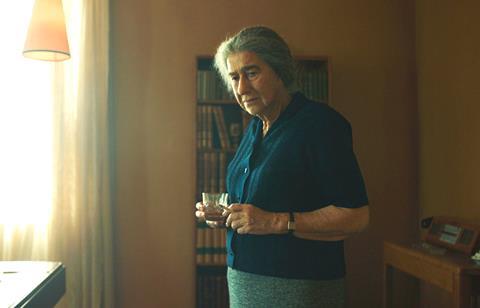Helen Mirren stars as the Israeli premier during the tense days of 1973’s Yom Kippur War

Dir. Guy Nattiv. UK, 2022. 100 mins.
When an iconic actor portrays an iconic figure, the success or failure of the project tends to depend on the power of the performance blasting away the wigs and prosthetics. Helen Mirren achieves all that while playing Israeli politician Golda Meir; but, in Golda, director Guy Nattiv and writer Nicholas Martin haven’t quite kept up their end of the bargain. Dropping the audience into the start of the 1973 Yom Kippur war with the chain-smoking caretaker premier, the film is a tense story of a woman and her generals around a cabinet table over the course of the conflict. Endless cigarette smoke, overflowing ashtrays, maps, a fat suit, a wiry wig, hairy eyebrows, orthopaedic shoes – but who was Golda Meir? The film prefers to avoid her as a human being, swerves her politics and replays the war from the perspective of her military cabinet over 10 charged days.
It wants to tell you how tough and fearless she was without saying who she was
It is, of course, incongruous to cast an British actor as the renowned Ukrainian/American/Israeli politician, teacher and fervent Zionist, thus requiring the generals and Meir’s assistant Lou (Camille Cottin) to also speak accented English throughout. It internationalises a film whose content speaks to Israelis who know the time, the personality, the war and its triggers and outcome. (It doesn’t contextualise enough for the casual viewer which, given it has been a half century since these events took place, a younger audience might have appreciated.) Golda isn’t really a film about Golda Meir – it’s using her to pick apart a particular crisis in Israeli confidence.
For those who want to revisit the Yom Kippur War, Nattiv and Martin use the trope of Meir having to testify about her part in it to the subsequent Agranat Commission. She thus looks back; but not on the uniquely interesting and politically motivated life that brought her from Kyiv to Milwaukee and a kibbutz in Israel — where she actually had two children, despite the fact that the film depicts her as being completely alone apart from Lou – and becoming one of the signatories of the Israeli Declaration of Independence.
This film is is focused solely from the point where her minister of defence Moshe Dayan (Rami Heuberger) tells her that war was unlikely despite the fact that Syrian forces were massing on the Golan Heights. From there, Golda ranges from the war cabinet, to Golda’s apartment, to the interior of a hospital where she is secretly receiving treatment for lymphoma in a morgue as the Syrian/Egyptian-led invasion progresses. It’s nearly all interiors, all smoke-filled (she even lights up on a gurney), shot in burnt colours by Jasper Wolf as if to convey the dry heat of the desert territory being fought over.
Golda drops crumbs of what looks like a powerful personality wrapped up in a powerhouse portrayal which ultimately has nowhere to go past impersonation, all the way up from thick ankles to thick eyebrows. Marketing will centre on Meir being ’Israel’s Iron Lady’, although Golda came first (as a side point, non-Brit Meryl Streep won her third Oscar for portraying Margaret Thatcher).
Although the film is 100 minutes long, it prefers maps and strategy to characters – such as Dayan, or Dado Elazhar (Lior Ashkenazi), or the rest of her all-male cabinet – or even how Golda Meir came to be on such friendly terms with German-born Jew and US Secretary of State Henry Kissinger (Liev Schreiber). It’s schematic too: the potential loss of Israeli life is personified by a female stenographer whose son is at the front. In a dense and talkative screenplay, it avoids the elements of what made Golda Meir into the kind of woman who could face down the assembled legendary men of war at that time, the men who pulverised the opposition in the Six Day War of 1968. It wants to tell you how tough and fearless she was without saying who she was. She is still a controverial figure in Israel: the person who supposedly said there is no such thing as Palestinian people. Is Golda scared of its own lead character?
Nattiv prefers to re-stage a war that has been a sore point for decades in Israel, which was presented as a victory domestically but was much more knife-edged than that. Dayan died more than 40 years ago; the same year the invading Egyptian president in this war, Anwar Sadat, was assassinated for trying to form a relationship with Israel. Golda Meir pre-deceased them by three years. The Yom Kippur War came at an extraordinary time in world geopolitics, and the relevance to today is inarguable – this was a year after the Munich massacre, when Meir supposedly instructed Mossad herself to track down and kill the culprits. A time of invasions and hijackings and global insecurity flowing out of the Middle East which Meir faced down, even though she was the reluctant premier of a brand new country – she had earlier retired due to illness, yet they brought her back in.
Golda is a tentative step towards looking at that inflammatory era with the depth it needs and that’s worthwhile: but plucking Golda out of her own life and that time out of its wider context still feels like a missed opportunity.
Production companies: Qwerty Films, Perfume Films
International sales: Embankment Films, info@embankmentfilms.com
Producers: Michael Kuhn, Nicholas Martin, Jane Hooks
Screenplay: Nicholas Martin
Cinematography: Jasper Wolf
Production design: Arad Sawat
Editing: Arak Lahav-Leibovich
Main cast: Helen Mirren, Liev Schreiber, Camille Cottin, Ellie Piercy, Rami Heuberger, Lior Ashkenazi, Ed Stoppard























